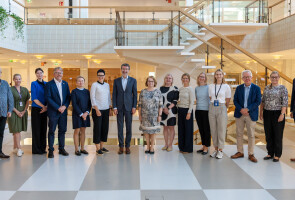The Finnish Research Infrastructure Committee (FIRI Committee) within the Research Council of Finland has selected 21 research infrastructures to Finland’s national roadmap for research infrastructures 2025–2028. The University of Turku is involved in the implementation of eleven infrastructures.
At its meeting on 2 December 2024, the Finnish Research Infrastructures Committee has selected 21 research infrastructures for the 2025–2028 national roadmap for research infrastructures.
The roadmap is a document that identifies the major national research infrastructures that are part of Finland's research infrastructure ecosystem. It is a tool for the research community, policy-makers and funders to guide investment and support research, development and innovation.
The aim of the roadmap is to ensure that research infrastructures remain internationally competitive, are able to respond to both current and future scientific challenges, generate new knowledge and expertise, and interact with RDI actors.
The selected research infrastructures can produce diverse and impactful knowledge for the needs of the scientific and academic community as well as the public and private sectors.
University of Turku involved in implementing 11 national research infrastructures in different fields
The University of Turku coordinates one national infrastructure and is a partner in ten other infrastructure projects.
“It is great that many of the key infrastructures for our research have been included in the roadmap and will therefore receive funding. The FIRE project, a new addition to the roadmap, will provide good support for the INVEST flagship. However, many of our applicants were not included in the national roadmap and the University should consider how we can support them as well. Our own infrastructure roadmap is an important tool in this," says Kalle-Antti Suominen, Vice Rector responsible for research at the University of Turku.
The Finnish Infrastructure for Register-Based Reserch (FIRE) is a remote access, application service and training infrastructure for conducting register-based research in Finland. FIRE will support the construction of novel research datasets and register-based research projects and train future generations of register data specialists in research and evidence-based decision-making. The infrastructure includes the University of Eastern Finland, University of Jyväskylä, Tampere University, Statistics Finland, University of Helsinki, Aalto University, and VATT Institute for Economic Research.
In addition, Euro-BioImaging Finland (EB-Fi), selected for the roadmap, will be coordinated from Turku and led by Åbo Akademi University, in close collaboration between the universities.
The University of Turku is also a partner in the implementation of ten other national research infrastructures.
The Biocenter Finland (BF) infrastructure includes the University of Helsinki, University of Eastern Finland, University of Turku, University of Oulu, Tampere University, and Åbo Akademi University. Biocentre Finland coordinates 17 technology platforms that cover key technologies used to study the most pressing global challenges from loss of biodiversity to pandemics and other severe healthcare challenges.
The Common Language Resources and Technology Infrastructure (FIN-CLARIAH) is a research infrastructure for Social Sciences and Humanities (SSH) comprising two components: FIN-CLARIAH and DARIAH-FI. FIN-CLARIAH seeks to significantly upgrade the SSH infrastructural support in four directions using large language models (LLM) and AI. The infrastructure includes the University of Helsinki, CSC - It Center for Science Ltd., Tampere University, University of Jyväskylä, University of Turku, University of Eastern Finland, Aalto University, and University of Oulu.
Cosmology Data Center Finland (CDC-FI) facilitates Finland’s participation in large international observational cosmology projects, such as the European Space Agency Euclid, and LISA observatories. The infrastructure includes the University of Helsinki, University of Oulu, Aalto University, University of Turku, and CSC - It Center for Science Ltd.
Euro-BioImaging: Research Infrastructure for Imaging Technologies in Biological and Biomedical Sciences (EB-Fi) is a research infrastructure consisting of Finland's leading, internationally renowned centres in biological and biomedical imaging. EB-Fi's imaging technologies and services have been central to numerous scientific and technological breakthroughs, as well as advances in diagnostics and clinical practices. The infrastructure includes Åbo Akademi University, University of Helsinki, University of Eastern Finland, Tampere University, Aalto University, University of Turku, Helsinki University Central Hospital, Kuopio University Hospital, University of Oulu, and Turku University Hospital.
The European Infrastructure of Screening Platforms for Chemical Biology (EU-OS FI) is a consortium of research infrastructures focused on chemical biology, providing open access to world class chemical biology infrastructures, technologies and expertise, with a compound collection of over 100,000 compounds and open database. Finland's membership in the EU-OS infrastructure brings new opportunities for national researchers to engage in high-quality research and innovation. The infrastructure includes the University of Helsinki, the University of Turku, Åbo Akademi University, and the University of Eastern Finland.
Finnish Marine Research Infrastructure (FINMARI) combines all major partners of the Finnish marine research community into an integrated and distributed research infrastructure that includes field stations, research vessels, laboratory facilities, flow-through platforms, autonomous measurement platforms, and buoys within the partnership. FINMARI’s development plan is based on addressing the multiscale variability of the marine environment by integrating the complementary areas of expertise of each partner. The infrastructure concentrates particularly on the global Triple Crisis, biodiversity loss, climate change, and pollution. The infrastructure includes the Finnish Environment Institute, University of Helsinki, University of Turku, Åbo Akademi University, Finnish Meteorological Institute, Geological Survey of Finland, and Natural Resources Institute Finland.
The Integrated Atmospheric and Earth System Science Research Infrastructure (INAR RI) coordinates national nodes of European environmental research infrastructures (ICOS, ACTRIS, eLTER and AnaEE). INAR RI comprises 30 measurement stations, exploratory platforms and data infrastructure. INAR RI integrates multidisciplinary comprehensive environmental measurements, and the research it promotes will positively impact climate resilience, protection from environmental hazards, and human health. The infrastructure includes the University of Helsinki, University of Eastern Finland, University of Turku, CSC - It Center for Science Ltd., Finnish Meteorological Institute, Finnish Environment Institute, Natural Resources Institute Finland, University of Oulu, Tampere University, and University of Jyväskylä.
Integrated Structural Biology Infrastructure Instruct-ERIC Centre Finland (Consortium FINStruct and Instruct FI) is a national, distributed, open access structural biology research infrastructure leading international research and development in biomolecular complex purification; cryogenic electron microscopy; single cell proteomics; native mass spectrometry; structural bioinformatics, X-ray crystallography and data management. FINStruct's flagship services form the Instruct Centre Finland, which is the national node of Instruct-ERIC, providing expertise and services internationally through the Instruct-ERIC service catalogue. The infrastructure includes the University of Helsinki, University of Oulu, University of Eastern Finland, University of Turku, and Åbo Akademi University.
The Open Geospatial Information Infrastructure for Research (Geoportti) is a cutting-edge digital research infrastructure enabling scientists to easily access geospatial data and geocomputing resources through centralized high-performance computing and cloud infrastructure. The research infrastructure offers more than 20 services related to data, geocomputing, equipment, geovisualization, and training. The research infrastructure is implemented by the Finnish Geospatial Research Institute (FGI) in the National Land Survey of Finland, Aalto University, CSC - It Center for Science Ltd., Natural Resources Institute Finland, Finnish Environment Institute, University of Eastern Finland, University of Helsinki, National Archives, and University of Turku.
The Finnish BioFoundry for synthetic biology and biomanufacturing (FINBioFoundry) brings together the scientific excellence and industry interface of VTT, Aalto University, University of Turku and Tampere University to develop cutting-edge, enabling solutions for industrial biotechnology. Key objectives of the FIN-BioFoundry are to provide a unique and enabling platform for cutting-edge science in synthetic biology and biomanufacturing research, enable high-level education and workforce training for research and bio-based industries, support an essential part of future circular bioeconomy development and national manufacturing resiliency, and form the Finnish node in the European IBISBA ESFRI infrastructure network dedicated to Industrial biotechnology. The research infrastructure includes the VTT Technical Research Centre of Finland, Aalto University, University of Turku, and Tampere University.
In addition, the University of Turku is involved in Biobanking and Biomolecular Resources Research Infrastructure of Finland (BBMRI.fi) through the Wellbeing Services County of Southwest Finland and Auria Biobank. BBMRI.fi is a research infrastructure comprising all ten public and academic biobanks in Finland and is part of the Finnish National Node of the European level BBMRI-ERIC infrastructure. The vision of BBMRI-ERIC is to build and strengthen the value-added sustainable biobanking enabling clinical translational research in academia and industry and facilitating developing new treatments and creating new innovations in personalised medicine. The research infrastructure includes the VTT Technical Research Centre of Finland, Aalto University, University of Turku, and Tampere University.
Infrastructures of the roadmap receive funding
All the research infrastructures selected for the roadmap will receive a total of €130 million in funding. Some of the research infrastructures have received their funding decisions in December, and the rest will receive their funding decisions at the end of January 2025.
The funding decisions of the University of Turku in December:
- The Finnish BioFoundry for synthetic biology and biomanufacturing (FINBioFoundry), Allahverdiyeva-Rinne, Yagut, €402,628
- European Infrastructure of Screening Platforms for Chemical Biology (EU-OS FI), Courtney, Michael, €224,187
- Finnish Marine Research Infrastructure (FINMARI), Hänninen, Jari, €149,243
- Cosmology Data Center Finland (CDC-FI), Kotak, Rubina, €18,809
- Integrated Atmospheric and Earth System Science Research Infrastructure (INAR RI), Suominen, Otso, €127,308



